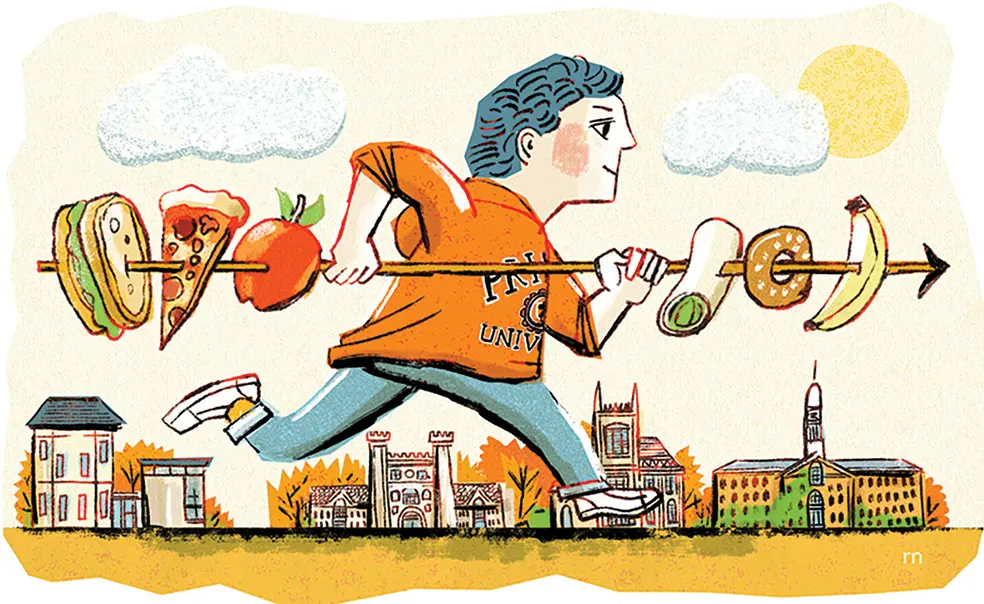My Week Eating Only Free Food at Princeton
“My inbox was flooded with emails promoting free food in every corner of campus. How hard could it be?”

There are many ways students feed themselves at Princeton: dining halls at the residential colleges, eating clubs, restaurants on Nassau. Try fighting a 7 p.m. crowd at Tacoria.
Or you could just eat for free. Free food litters campus nearly every day, leftover from events, USG giveaways, and recruiting receptions. A whole listserv is populated with dozens of postings per week, advertising sandwiches for the taking at the Carl A. Fields Center or Yemeni pastries in Bloomberg Hall. Such volume prompted a question: Would it be possible (for, say, a PAW intern) to exist solely on free food?
A prior such attempt by a PAW student writer nearly 10 years ago ended after three days. That felt like too small a challenge. After all, my inbox was flooded with emails promoting free food in every corner of campus. How hard could it be? Buoyed by a competitive spirit and perhaps some naive optimism, I downed my Monday morning coffee and started the clock on trying to go one week, Monday through Friday, eating only free food.
For students who started college during the pandemic, the listserv held the same status as Atlantis: a legendary relic of a time gone by. However, unlike the fictional underwater kingdom, the listserv has returned to form.
Monday opened strangely quiet. I expected that soon a handful of options would come rolling through for a nice study break lunch, so I waited … and waited … and waited. A posting for leftovers from the popular deli Olives seemed too far away — it would likely be gone by the time I arrived — and there was not a single other posting between noon and 5 p.m. I was beginning to worry this project would begin with an unintentional full-day fast. However, at 7:15 p.m., my email suddenly sprang to life. “Pizza and Connalis [sic] in Murray Dodge,” the email read, sent three minutes ago. It seemed like the perfect break, but by the time I walked in at 7:27, there was not a slice of pizza to be seen, only an empty box haphazardly placed on top of the woefully small recycling bin. Another student who had come in search of a free slice or two lamented how quickly they had gone. He mentioned how a less scrupulous student could pass through the library of Mathey College and enter the servery without paying. Dejected and not (yet) eager to try such a trick, I returned to my room with a dinner of miscellaneous snacks left in Mathey’s common room.
However, Tuesday dawned a new day, and I was determined to make good on my weeklong quest. As many sleep-deprived undergrads do, I generally skip breakfast, so after coffee at the PAW office (perks!), I hoped to see lunch options roll in. A deluge began: sandwiches in Scheide Caldwell, an early dinner (and leftovers to take home) at the Hellenic Studies coffee hour, late night Jules pizza at Whig-Clio. Fully satisfied — and now armed with leftovers to avert any Monday-like disasters — I had renewed confidence that this was an achievable goal.
Princeton’s free food emails have been a staple for more than a decade, but the cancellation of in-person events in 2020 and much of 2021 put the listserv in peril. For students who started college during the pandemic, the listserv held the same status as Atlantis: a legendary relic of a time gone by. However, unlike the fictional underwater kingdom, the listserv has returned to form. One alumnus, Michael Kim ’23, even became the de facto “king” of the free food listserv, garnering a Daily Princetonian feature about his exploits last year. Though it can be a savior to hungry students, the listserv also reveals an unsettling truth: While many leftovers are scooped up by eager and appreciative undergrads, the sheer number of posts means a lot of food, especially in less-trafficked corners of campus, ends up in the garbage (or maybe a compost bin).
Wednesday and Thursday were positively boring relative to Tuesday’s highs (my meals included sandwiches from a PAW event, West African chicken and rice, and leftovers from Tuesday). A major problem I encountered was one of timing: On Wednesdays and Thursdays, I have class for much of each afternoon, prime time for lunch leftovers. To the truly determined student hoping for repeatable free food, I only offer two words of advice: morning classes.
Friday began with a nice breakfast from At Earth’s End, courtesy of the student government’s “Thesis Friday” initiative. Late Friday afternoon, I caught an email with the subject line “[Free Food] Sandwiches, Cookies, Salad, Chips and Soda in Frist MPR,” briskly walked to the campus center’s empty basement, and was greeted by trays and trays of sandwiches, wraps, cookies, and salad. I grabbed a few wraps and a couple cookies for “lunch,” plus a few sandwiches for later, and found myself thinking about how I would break my streak on Saturday. While I was by no means starving — and my bank account would thank me — I had no wish to prolong my five-day experiment. After much deliberation given the myriad choices I now had, I made a Saturday afternoon trip to Cava on Route 1. Fast-casual Greek food never felt so earned, even if I didn’t have to run across campus to get it.










1 Response
Nathan Mytelka ’19
1 Year AgoA Free Food Veteran: Two Years Without a Meal Plan
I was amused in reading the article “My Week Eating Only Free Food at Princeton,” as I happen to be an expert on that topic — admittedly before COVID. Like any sedulous Princetonian should, I did my research before I started and even spent a semester with “training wheels”: a meal plan combined with free food. When I started for real, I went two years without needing to pay for food, rearrange my schedule, or stash leftovers in my room. And though I’m not a gourmand by any means, my average meal at Princeton was of higher quality than the average meal for any other year of my life.
I’ll admit I was also motivated by the food that gets thrown away. I’ve never been able to waste food, finishing my plate every time for as long as I can remember, and it makes me sad when perfectly good food goes to waste. When there was an extreme excess of food in a faraway location, I sometimes made a point of going there and bringing as much of it as I could back to Frist to redistribute there. My little way of trying to help the planet.